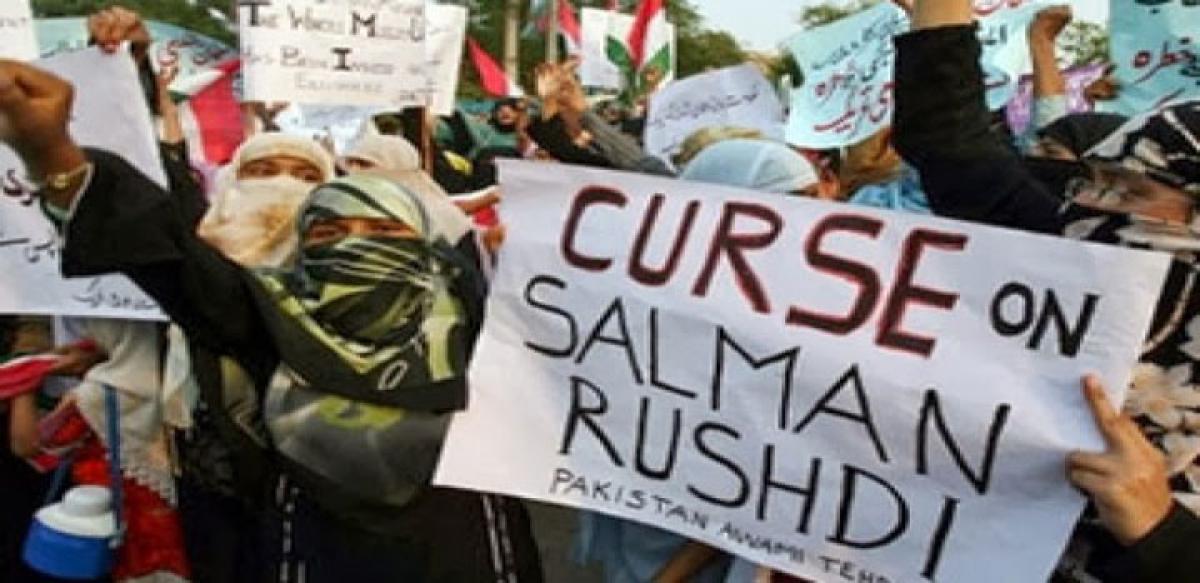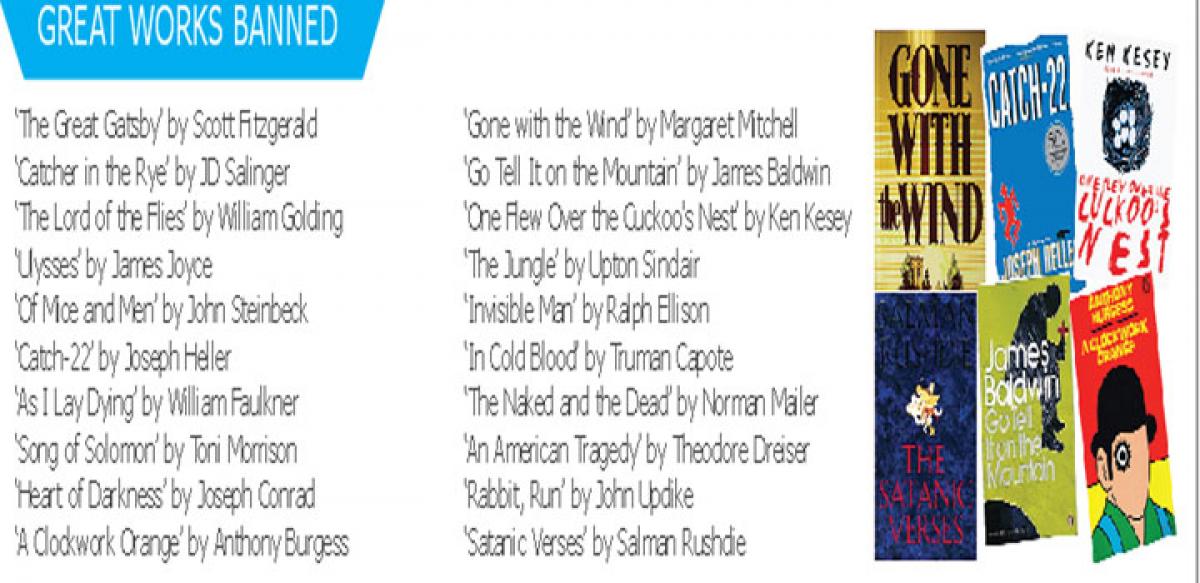Live
- Walls near Begumpet, RK Puram railway stations hit denizens hard
- Security forces destroy suspected IED found in J&K
- Gang behind cable theft in Metro busted
- AAP files plaint against BJP leader Chahal
- HC grants relief to actor Mohan Babu, stays police notices
- 'Grateful to all': Didi on INDIA bloc chief's role
- HMWSSB completes 50% of 90-day desilting special drive
- Lot to be done to get rid of manual scavenging: SC
- Cong-AAP 'alliance' will not make any difference
- Don’t rely too much on PAs, Gutha cautions lawmakers
Just In

It is hardly a lead for a piece but does merit being featured in a literary quiz – what, oh wait, we will spice this line a bit, what on earth, is common to – and now the list itself – The Holy Bible, The Holy Quran, if I could throw a few redundant adjectives for the two next titles, the evil ‘Mein Kampf’ (Adolf Hitler),
Great books serve as a bridge to the past and a window to future; and have many a time evoked anger, hatred and protests – from public and governments alike; several such ones were banned too. But the pen, aligned to patience, and conviction, has always beaten the gun

It is hardly a lead for a piece but does merit being featured in a literary quiz – what, oh wait, we will spice this line a bit, what on earth, is common to – and now the list itself – The Holy Bible, The Holy Quran, if I could throw a few redundant adjectives for the two next titles, the evil ‘Mein Kampf’ (Adolf Hitler), an innocuous ‘Alice in Wonderland’ ( Lewis Carroll) and the soul-touching ‘Diary of a Young Girl’ (Anne Frank)? If you are still holding on to the visualisation of a quiz, you can hear the buzzers. And a few wrong answers.
Freedom comes with responsibility. If you are not responsible enough as a person, a citizen, or as a human being and misuse the pen, you deserve to be banned. But another equally important aspect is who bans the book? Is that body fair and responsible enough? None of these two issues have a conclusive answer.”- Koral Dasgupta Author, Academic, Columnist
Great books, obviously an empathic yes but now the answer we are looking for, have impacted human history hugely though in different ways – sure, yes again. But what quizmaster would throw away prize-deciding points for that. Then the question passes through the audience, with more speculations and hypothesis than answers before a disappointed (or triumphant) quiz master gives it away – books that were banned.
At this point, the lead writer takes charge and edits it to rewrite the lead as a desperate alliteration – brilliant books, bizarrely banished by bigots before being banned by bureaucratic brigades but bearing brunt, battled bruised bibliophiles bravely bulldozed bans.
Now add a few more titles, now most classics and you get a sense of the history of banned books. Hailed as a masterpiece amongst dystopias, ‘Brave New World’ by Aldous Huxley was banned in Ireland for taking on a controversial theme of abortion, after which, in the USA, efforts were made to remove it from schools. In stark contrast, ‘The Grapes of Wrath’ by John Steinbeck found support from the elite but general public, too shocked by the literary handling of the fate and nature of poor people, was burned publicly.
Now consider this – “It is not a book. It is a cesspool, an open sewer, a pit of putrefaction, a slimy gathering of all that is rotten in the debris of human depravity.” No, not an angry reviewer but a quote from the judgment from the Supreme Court of the State of Pennsylvania in the hearing on ‘Tropic of Cancer’ by Henry Miller.
Freedom of speech includes the freedom to offend. But absolute freedom of speech is a myth in India. They can't even tolerate Facebook posts of teenage girls without jailing them. Quite pathetic!” If the citizens are so animalistic that any small word can provoke their "sentiment" and drive them to dastardly deeds, then they don't deserve to be called humans. Instead, we work the other way around and ban anything that may be remotely inflammatory, to a point where even the word “shit” is censored from TV shows. - Puneeta Uchil Author, Objectivist, Content Consultant
‘Lolita’ by Vladimir Nabokov was banned, called “the filthiest book I have ever read” by the editor of a leading newspaper, prompting the official agencies to seize copies on grounds of pornography. ‘The Metamorphosis’ by Franz Kafka was banned by both Nazi and Soviet regimes.
Some authors were subject to repeat bans and controversy – DH Lawrence created a public furore with three of his great works – ‘Sons and Lovers’, ‘Women in Love’ and ‘Lady Chatterley's Lover’. The two epics of George Orwell – ‘Animal Farm’ and ‘1984’ were both banned, while Ernest Hemingway experienced government scorn and censorship for both ‘The Sun Also Rises’ and ‘A Farewell to Arms’. Neither ‘Slaughterhouse Five’ nor ‘Cat's Cradle’ by Kurt Vonnegut could escape the guillotine before time restored their places in public libraries and reader’s acclaim. Even Harry Potter series by JK Rowling found passions rising in the Church and restricted in several states within the USA and Europe, and children were told not read it.

The greatest tales of censorship involves our most colourful writers, who have become icons of the theme of an unending war between the pen and gun – Fyodor Dostoevsky, Oscar Wilde and Salman Rushdie. Dostoevsky was banished to Siberia by the sovereign critic, the Czar, who also awarded him the ultimate literary prize, which no author can return – the death sentence. Facing the firing squad, Dostoevsky won a dramatic reprieve at the last minute with a pardon rushing to the spot on horseback. Ironically, the Czar indeed did not share the literary tastes of Dostoevsky, in whose plots a twist like this anecdote would have never passed the test.
Wilde was a trouble maker, with his wit and sense of life – ahead of not merely Victorian England but of perhaps most cultures in future too, with merely a few lines in his preface to ‘The Diary of Dorian Gray’ creating enough ruckuses as to justify his vilification and public abuse.
And Rushdie, the modern day villain, had The New York Times say when ‘The Satanic Verses’ saga broke out –“Swift's ‘Gulliver's Travels’, Voltaire's ‘Candide’, Sterne's ‘Tristram Shandy’... Rushdie, it seems, is very much a latter-day member of their company."
Indian Ban League
Independent India started its journey with the freedom at night tryst on a slightly wrong foot. An infant nation took the rights of expression of the killer of the father of the nation. With a ban on Nathuram Godse’s ‘May It Please Your Honour’, we launched our ban league. The Mahatma sure would not have approved of the implicit violence of a ban; or crush the voice of his own killer. The nation traded to please the memory of the father, by sacrificing his foremost value with it.


© 2024 Hyderabad Media House Limited/The Hans India. All rights reserved. Powered by hocalwire.com







